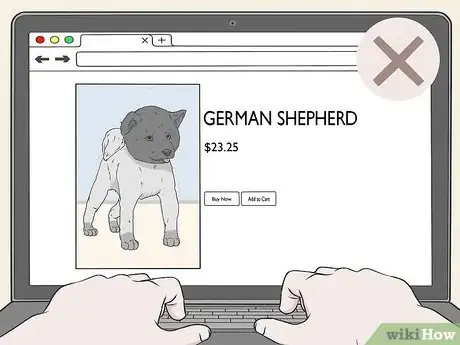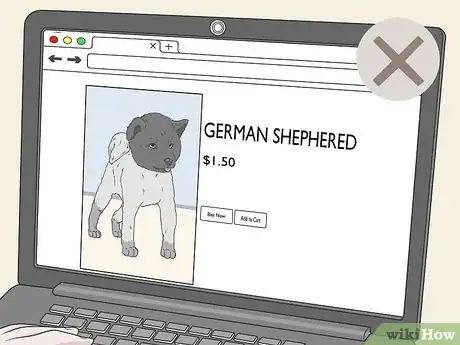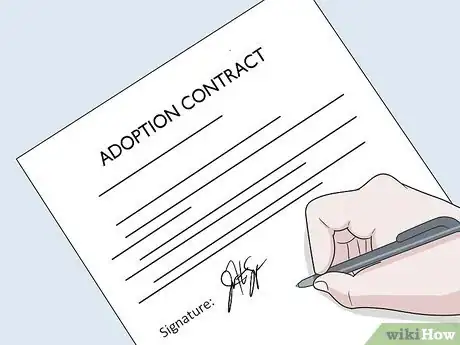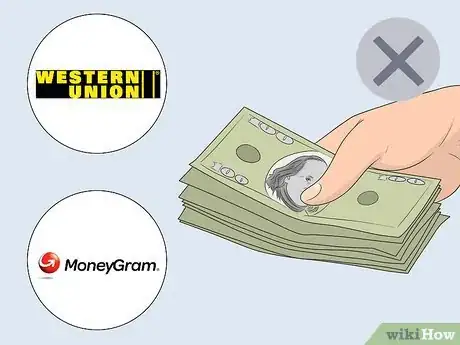This article was co-authored by Pippa Elliott, MRCVS. Dr. Elliott, BVMS, MRCVS is a veterinarian with over 30 years of experience in veterinary surgery and companion animal practice. She graduated from the University of Glasgow in 1987 with a degree in veterinary medicine and surgery. She has worked at the same animal clinic in her hometown for over 20 years.
This article has been viewed 192,059 times.
Buying a puppy can be a complex process, but adding an adorable new member to your family is well worth it. You can find many sellers online, but it is important do your research. Look for red flags on potential breeders' websites, like obvious spelling errors and stock photographs lifted from other websites. Speak with breeders in person or over the phone and ask for references. Trust breeders who are interested in learning more about you and your abilities to care for a dog. Do your best to find a reliable breeder and avoid supporting mistreatment of dogs by buying from a puppy mill. Before buying online, consider adopting from a local shelter or rescue group.
Steps
Finding a Reliable Breeder Online
-
1Search online for a breeder or rescue club within driving distance. Consider finding a breeder that’s close enough to make a personal visit. Visiting a breeder’s facilities is one of the clearest ways to see how legitimate they are. Trust breeders who are proud to show you their property.[1]
- If they don't want to show off their facilities or take pride in them, steer clear.
- Ask to see the facilities in full when you visit. Look for clean conditions and animals’ general demeanors to gauge the breeder’s quality. Dogs should be friendly, social, and not shy away from you or other visitors.
- Make sure the location breeds only one or a few types of dogs. The breeder should not specialize in more than a few breeds and should provide living space appropriate for dogs' size and breed.[2]
- They should be knowledgeable about their breeds' characteristics, history, and any potential genetic or developmental concerns. They should openly and clearly help you understand the type of dog you're buying.
- Ask to see certification that both parents of the litter you’d likely get a dog from have been genetically tested for breed-related problems.
-
2Talk to the breeder on the phone. If you find a breeder that’s too far away to visit, ask for a phone number, or call the number posted on their website. While email will probably be your initial means of communicating, never a buy a puppy unless you’ve spoken directly to the breeder.[3]
- Breeders who ask to speak on the phone or volunteer their phone number in the first few emails are the most trustworthy. Look for a breeder who is easily accessible and is open about their contact information.
- If they don't offer a phone number right away, try writing, "I'd really like to speak over the phone. I'm more comfortable making a purchase from someone I've had a conversation with, and I have a lot of questions about the process."
- Cross check the area code with the location of the breeder. If they don’t match, find another breeder.
- When you make the initial call, don't mention which breed you are interested in. Puppy mills typically have several breeds available, so the breeder may not know which you are inquiring about. However, a genuine breeder will most likely only have one litter ready at a time and will know instantly which breed you are asking about.
Advertisement -
3Ask for references. When you contact your potential breeder, ask for references from previous clients. Look on their website for testimonials or other credentials. If they have a social media page, look through their comments.
- Try asking, "Is there anywhere I can read testimonials from past customers? Do you have a list of reviews available, or offer any references? Do you have ties to any nearby shelters or humane societies?"
-
4Contact shelters and vets near the potential breeder. Search online to find a vet near the breeder's location, and call them to ask if they know anything about their breeding practices. You should also think about contacting nearby shelters or trainers to ask about the breeder's quality and reputability.
- Ask them if they've heard of that particular breeder and if they know anything about their practices.
- Ask if they have any recommendations, especially if you're doing research on a breeder in your own area.
-
5Look for breeders who ask you questions. When you speak with the breeder on the phone, pay attention to the questions they ask you. Don’t trust a breeder who isn’t interested in learning more about you, as they are more likely to be interested only in making money.[4]
- They should ask you if you’ve ever owned a dog, why you are interested in purchasing a dog, and about details regarding your family and who will be the primary caregiver.
-
6Ask to see personalized photographs. Don’t settle for the pictures that advertise your prospective dog online. Ask the breeder to see a range of photographs from different ages. In addition, ask the breeder to place a small card in photographs of the dog with your name or the date written on it.[5]
- Ask for several angles so you can verify that the card wasn’t edited into the image.
- Insist on seeing photos of the puppy with its mother. Genuine breeders will always have the mother dog nearby. On the other hand, puppy mills often try to make excuses for why they can’t show the mother in order to conceal the deprived condition she’s kept in.
Avoiding Problems
-
1Consider adopting from a shelter or rescue club. The easiest way to avoid an online scam is to adopt from a local shelter or breed rescue club. Adopting instead of shopping online will eliminate all risks associated with buying online, including having your money stolen or never receiving your dog. In addition, adopting helps curb pet overpopulation, and avoids the risk of supporting a puppy mill, which mass produces animals in poor living conditions.[6]
-
2Be extra careful when browsing free classifieds. When searching online for a reliable breeder, you’ll find plenty of legitimate ads on sites that list classifieds for free. However, you’ll have to spend extra time double checking these ads. Online scammers are more likely to post on sites that do not require a fee to post ads, such as Craigslist.[7]
-
3Look for obvious website errors. Online scams typically copy and paste text from legitimate breeder sites. They also lift photographs from legitimate websites, but caption them incorrectly.[8]
- Look for passages of text that seem inconsistent, as if one paragraph were stolen from a legitimate source and the next poorly written.
- Look for photographs that are captioned incorrectly. For example, you might see a picture of one breed but its caption names it another breed.
- Check for watermarks on the images that were placed there by a legitimate breeder. If it doesn’t match the name of the website you’re looking at, contact that name posted on the watermark.
- Look for any blurry marks that might be covering up watermarks.
-
4Don’t fall for prices below market value. Beware of rock bottom prices far below a breed’s standard. Look online for a variety of breeders, and email or call them to ask about their pricing. Make a trip to a local pet store or look at their website to get a better idea of what a standard price looks like.
- If you see an outlier, or a price that’s far below most of the others you’ve seen, it’s probably a scam.
-
5Report cases of suspected fraud. If you suspect a website of being fraudulent, you can report it to the Federal Trade Commission (FTC) if you’re in the United States. Use their toll free hotline: 877-FTC-HELP (877-382-4357). You can also fill out an online complaint form on their website: http://www.ftc.gov
Completing the Purchase Safely
-
1Consider using a puppy finder company. Puppy finder companies check the breeder's background, examine the puppy's health, and make sure the puppy's pedigree is in order. They also ensure vaccinations are up to date and help you with language issues and transportation if necessary.
- A legitimate puppy finder company will have a proven track record, previous customers you can talk to, and a social media page where you can double check comments.
- Puppy finders are not escrow companies. In other words, they don’t hold money until you receive your money in order to secure the transaction. If a breeder or puppy finder makes any such claims, they are most likely illegitimate.
-
2Sign a well-defined contract. The breeder should provide a thorough contract that includes a health guarantee. A good breeder will have you agree to return the dog in the event that you can no longer care for it. In addition, they will provide documentation proving the dog’s breeding line has been tested for genetic and other health defects.[9]
-
3Make sure the breeder offers a guarantee. A good breeder will offer a guarantee in case your puppy or dog shows signs of health problems within the first several days of ownership. Take your new dog to the vet within 24 hours of picking it up or having it shipped.[10]
- Ask the breeder about their guarantee prior to finalizing your purchase. If they don’t offer a guarantee, find another breeder.
-
4Never ever send money by Western Union or MoneyGram. Never use an unsecured wire transfer service when making a purchase online. If something goes wrong, these services will not help you get your money back.
- Use your credit or debit card that will allow you to dispute a transaction.
- Before handing over your credit card number, ask the breeder for their merchant number. Call your credit card company to verify that the number is legitimate.
References
- ↑ http://www.humanesociety.org/issues/puppy_mills/tips/buying_puppy.html
- ↑ http://www.humanesociety.org/assets/pdfs/pets/puppy_mills/find_responsible_dog_breeder.pdf
- ↑ http://www.humanesociety.org/assets/pdfs/pets/puppy_mills/find_responsible_dog_breeder.pdf
- ↑ http://www.humanesociety.org/assets/pdfs/pets/puppy_mills/find_responsible_dog_breeder.pdf
- ↑ http://www.humanesociety.org/assets/pdfs/pets/puppy_mills/find_responsible_dog_breeder.pdf
- ↑ http://www.aspca.org/animal-cruelty/puppy-mills/why-you-should-never-buy-puppy-online
- ↑ http://www.dogbreedinfo.com/scammingbuyers.htm
- ↑ http://nopetstorepuppies.com/buying-a-puppy-online-is-bad-too
- ↑ http://www.humanesociety.org/assets/pdfs/pets/puppy_mills/find_responsible_dog_breeder.pdf
About This Article
To buy a puppy online safely, make sure you go through a reputable breeder with good references. Be careful searching on free classifieds like Craigslist since scammers are more likely to post on them. If an ad for a dog seems poorly written or too good to be true, there's a good chance it's a scam. Also, never send someone money through an unsecured wire transfer service, like Western Union or MoneyGram, since you won't be able to get your money back if it's a scam. For more tips from our Veterinarian co-author, like how to find a reputable breeder, read on!









































































